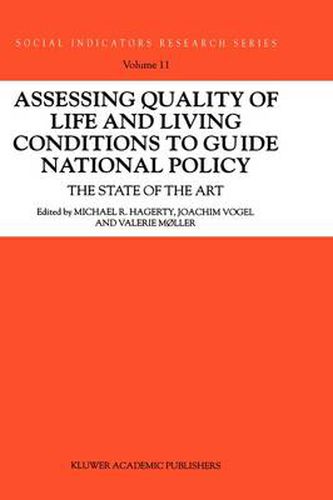Readings Newsletter
Become a Readings Member to make your shopping experience even easier.
Sign in or sign up for free!
You’re not far away from qualifying for FREE standard shipping within Australia
You’ve qualified for FREE standard shipping within Australia
The cart is loading…






This title is printed to order. This book may have been self-published. If so, we cannot guarantee the quality of the content. In the main most books will have gone through the editing process however some may not. We therefore suggest that you be aware of this before ordering this book. If in doubt check either the author or publisher’s details as we are unable to accept any returns unless they are faulty. Please contact us if you have any questions.
This text is a how to book for researchers and government offices wanting to start or improve their own quality of life (QOL) survey. It contains best practices from all over the world and discusses surveys that are being adopted by all countries in the European Union as a standardized measure of each country’s progress. It also discusses how developing countries can begin the measurement of quality of life in ways that will increase political credibility and require smaller budgets. Other chapters describe policy applications of the quality of life surveys, including nations’ health goals, smoking cessation, child welfare and poverty reduction. The authors of these chapters are some of the world’s top experts on assessing quality of life. For example, the author of the first chapter is Sten Johansson, former Director of Statistics Sweden, responsible for creating the first comprehensive QOL assessment systems in the world, beginning in the 1960s. The author of the second chapter is Professor Ruut Veenhoven, known as the premier researcher on national happiness, having developed the largest database in the world on the subjective measures of well-being. Heinz-Herbert Noll is responsible for developing the unified quality of life measurement system for the European Union, where up to 25 countries will be assessed using the same methodology and questionnaires. This volume should be a useful resource for four groups of readers: to researchers interested in best practices for well-established surveys of living conditions, the papers by Boelhouwer, Noll, Vogel, and Berger-Schmitt will be of special interest; to researchers and policy analysts interested in establishing a living-conditions report in their country, the papers by Kamen, Moller and Dickow, Estes, Andersen and Poppel, May, Stevens and Stols and Aasland and Tyldum give information about developing credibility, consensus-building and survey design; for researchers interested in cross-national comparison, the papers by Hudler and Richter, and Delhey, Bohnke, Habich and Zapf describe the rich resources already available, as well as problems of different wording, interpretation, etc; and finally, for citizens wishing to effect changes in public policy, and for researchers studying that process, the papers by Ferris, Estes, Hagerty and Behrendt outline how organizations should select goals, utilize social indicators and develop programmes that improve the quality of life in their nations.
$9.00 standard shipping within Australia
FREE standard shipping within Australia for orders over $100.00
Express & International shipping calculated at checkout
This title is printed to order. This book may have been self-published. If so, we cannot guarantee the quality of the content. In the main most books will have gone through the editing process however some may not. We therefore suggest that you be aware of this before ordering this book. If in doubt check either the author or publisher’s details as we are unable to accept any returns unless they are faulty. Please contact us if you have any questions.
This text is a how to book for researchers and government offices wanting to start or improve their own quality of life (QOL) survey. It contains best practices from all over the world and discusses surveys that are being adopted by all countries in the European Union as a standardized measure of each country’s progress. It also discusses how developing countries can begin the measurement of quality of life in ways that will increase political credibility and require smaller budgets. Other chapters describe policy applications of the quality of life surveys, including nations’ health goals, smoking cessation, child welfare and poverty reduction. The authors of these chapters are some of the world’s top experts on assessing quality of life. For example, the author of the first chapter is Sten Johansson, former Director of Statistics Sweden, responsible for creating the first comprehensive QOL assessment systems in the world, beginning in the 1960s. The author of the second chapter is Professor Ruut Veenhoven, known as the premier researcher on national happiness, having developed the largest database in the world on the subjective measures of well-being. Heinz-Herbert Noll is responsible for developing the unified quality of life measurement system for the European Union, where up to 25 countries will be assessed using the same methodology and questionnaires. This volume should be a useful resource for four groups of readers: to researchers interested in best practices for well-established surveys of living conditions, the papers by Boelhouwer, Noll, Vogel, and Berger-Schmitt will be of special interest; to researchers and policy analysts interested in establishing a living-conditions report in their country, the papers by Kamen, Moller and Dickow, Estes, Andersen and Poppel, May, Stevens and Stols and Aasland and Tyldum give information about developing credibility, consensus-building and survey design; for researchers interested in cross-national comparison, the papers by Hudler and Richter, and Delhey, Bohnke, Habich and Zapf describe the rich resources already available, as well as problems of different wording, interpretation, etc; and finally, for citizens wishing to effect changes in public policy, and for researchers studying that process, the papers by Ferris, Estes, Hagerty and Behrendt outline how organizations should select goals, utilize social indicators and develop programmes that improve the quality of life in their nations.